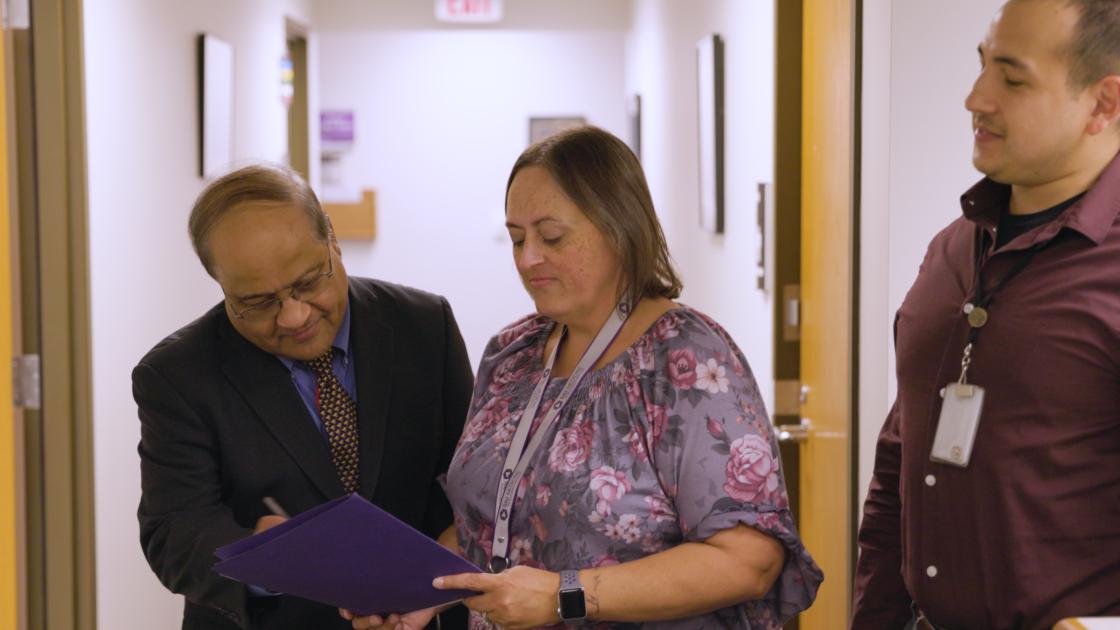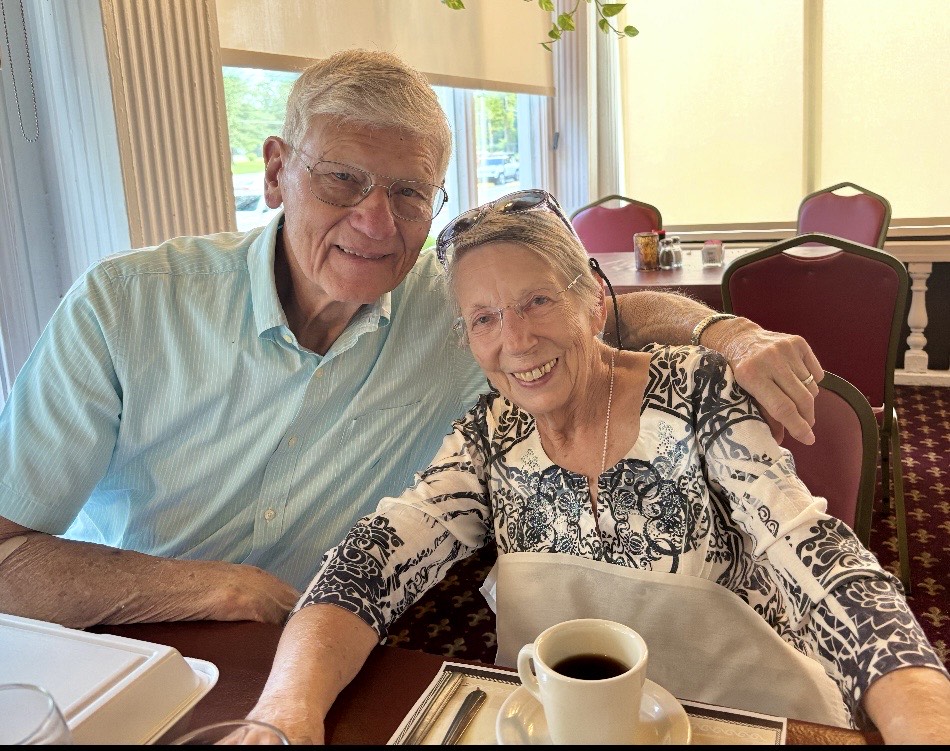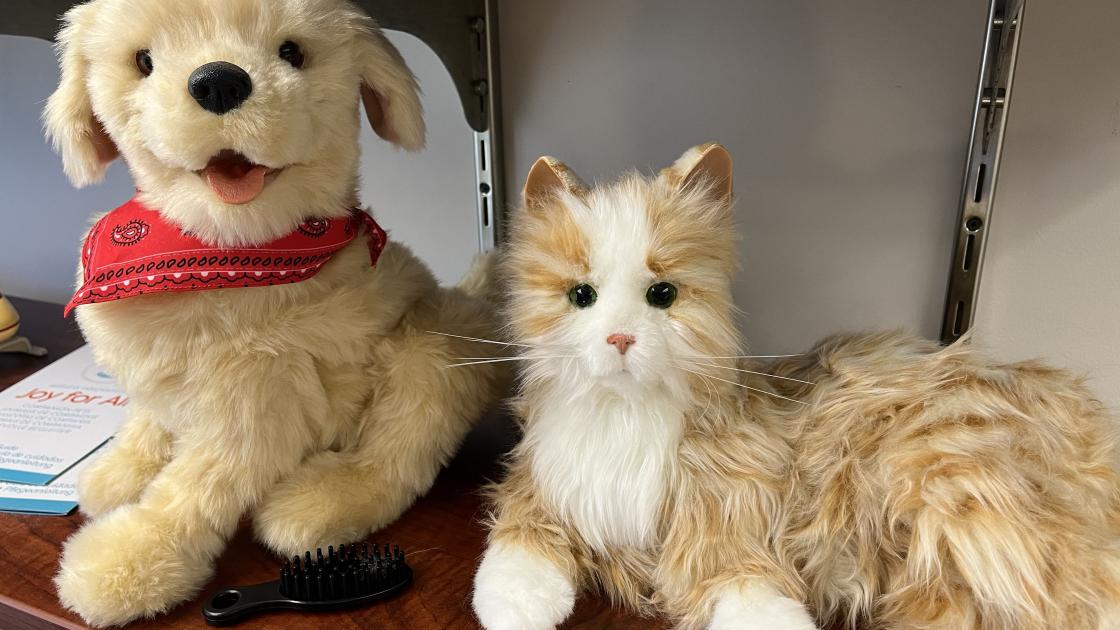
Where research meets compassion
How Alzheimer's clinical trials offer more than hope for both patients and caregivers
Throughout their lives, Chuck and Reva Krell made the most of opportunities.
For Chuck, he can’t help himself – his curiosity connects him with new people, first venturing into radio communications in the Navy before shifting to sales, where he rode the Xerox wave in the '60s. Chuck found the ultimate connection with his wife, Reva, a nurse whose determination matched his own. Together, they decided to blend career and life, starting a new venture down the road from Quincy.
“We quit both of our jobs in ‘76, moved to Jacksonville, Illinois, and opened up a Quick Print shop,” Chuck said. “The first two weeks we made $198 and people said, ‘What the hell were you thinking?’ And I replied, ‘Failure is not in our vocabulary. It's called motivation.’”
Chuck and Reva’s love for each other bolstered that determination.
“Reva and I ran a successful print shop for 45 years. We were with each other 24/7, and we’re still married,” Chuck said.
After selling the print shop, they moved to Concordia Village in Springfield in 2011.
“Oh, and by the way, we just celebrated our 60th wedding anniversary in February.”
Connecting with a calling
Their bond made it quite apparent when something changed several years ago. Reva was convinced conversations between the two of them hadn’t happened and information wasn’t being shared. Her doctor recommended visiting the Smith Alzheimer’s Center at SIU Medicine. The two met with Tom Ala, MD, and a diagnosis of memory loss was made.
Soon after, the idea of clinical trials was brought up. Chuck, who’s always ready for a new adventure, had some trepidation. But Reva insisted this was the right thing to do.
“I'm an old nurse, and this is what old nurses are supposed to do,” Chuck recalled Reva’s reaction. “If it's going to help somebody, that's what I want to do.”

That’s a common sentiment for those participating in clinical trials, says Stephanie Kohlrus, senior clinical research coordinator for the Center for Clinical Research (CCR) at SIU Medicine. For a condition like Alzheimer’s, which has an ongoing search for treatments that stop or even slow the progression of the disease, there’s hope that the next treatment offers a breakthrough. Even if the treatment doesn’t help them today, it can help future generations.
What is immediate, no matter the trial, is the human connection that Kohlrus’ team has with those who participate.
“Some of these trials can go on for quite some time and the connections we build with caregivers and patients is deep and lasting,” Kohlrus said. “Yes, we’re here for studies on new treatments, but we’re also a lifeline for families. Alzheimer’s is often isolating, and this helps break that isolation.”
That warmth and friendliness sold Chuck. Reva has now participated in three clinical trials and Chuck quickly learned he can grab his regular cup of coffee, joke with the team and use that inquisitive sales background to chat up someone new.
“You get to know them, and it's just like family,” he said. “They'll even bring in students and others in training. They know if they leave them with Chuck for about five minutes, he’ll find out who their parents are, where they went to school and more.”
A trusted team with decades of expertise
The Alzheimer’s clinical trials team has decades of experience working together. For nearly 20 years, the group of: Amy Richey, LPN, Ann Jirmasek, LCPC, Dr. Ala and Kohlrus worked side-by-side. Since Dr. Ala’s retirement, Jennifer Arnold, MD, PhD, stepped in to ensure a seamless transition. Supported by a skilled team of CCR coordinators, specialists and research nurses, SIU Medicine provides a full-team approach to clinical trials.
It’s a critical component of being part of the clinical trials team – expertise and longevity make SIU Medicine a trusted site.
But Kohlrus is clear. The CCR team at SIU Medicine is here to provide the community an opportunity to access the newest treatments. Trials have different requirements and ways to be administered. The CCR team works with each potential participant individually to make sure the clinical trial is right for them. And if they choose to stop, that’s OK.
“I think the biggest misconception about clinical trials is that we work for the drug companies,” Kohlrus said.
Most Alzheimer’s drug clinical trials are Phase 3, meaning the new treatment has already undergone rigid, controlled studies to help ensure its safety and efficacy. Phase 3 trials are expansions of successful Phase 2 trials to help confirm long-term effectiveness.
“Our number one job as a clinical trials team is protecting the rights, safety and welfare of our participants,” Kohlrus said. “That always comes first.”
Finding more than hope
For Chuck and Reva, clinical trials are more than medicine. They’re another chance to live with purpose, not only for themselves, but others as well. In that way, the Krells’ journey mirrors the mission of SIU Medicine: curiosity that drives research, connection that eases isolation and courage that brings hope for tomorrow.
Chuck knows that clinical trials may not be for everyone. But he’s glad that it’s now a part of his and Reva’s lives.
“It's been enjoyable. I've learned some things, met a lot of new friends,” Chuck said. “You have to make up your own mind about it.
“But in my case, it's all been good.”



